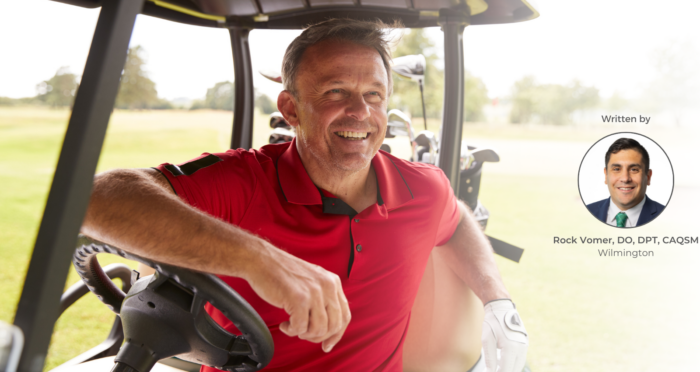Golf is a sport that combines skill, precision, and physical fitness, offering a great way to enjoy the outdoors and stay active. However, like any physical activity, golf can lead to injuries, especially if proper techniques and preventive measures are not followed. Understanding the common injuries associated with golf and how to prevent them is crucial for both amateurs and seasoned players. Let’s cover the most frequent golf injuries and provide practical tips to help you swing safely and keep your game on course.
Common Golf Injuries
Lower Back Pain
Causes: The repetitive motion of swinging a golf club can strain the lower back, particularly if the swing mechanics are poor or if there is insufficient core strength.
Prevention: Engage in regular core strengthening exercises, maintain proper posture during the swing, and ensure your swing mechanics are correct. Warm up thoroughly before playing to prepare your muscles and joints.
Golfer’s Elbow (Medial Epicondylitis)
Causes: This condition arises from overuse of the muscles and tendons in the forearm, leading to pain and inflammation on the inside of the elbow.
Prevention: Use proper grip techniques to avoid excess strain on the elbow. Strengthening the forearm muscles and incorporating flexibility exercises can also help reduce the risk.
Rotator Cuff Injuries
Causes: The rotator cuff, a group of muscles and tendons surrounding the shoulder joint, can be damaged by the repetitive overhead motions involved in a golf swing.
Prevention: Strengthen the shoulder muscles through targeted exercises and maintain flexibility. Avoid over-practicing and ensure proper swing mechanics to minimize strain on the shoulder.
Knee Pain
Causes: The twisting motion of the golf swing can place stress on the knees, especially if there is pre-existing weakness or injury.
Prevention: Strengthen the muscles around the knee, particularly the quadriceps and hamstrings. Consider using a knee brace if you have a history of knee problems.
Wrist Injuries
Causes: The impact of hitting the ball, especially from rough or uneven lies, can lead to wrist injuries, such as tendinitis or fractures.
Prevention: Use proper swing techniques to reduce strain on the wrists. Strengthen the wrist and forearm muscles, and consider using wrist supports if needed.
Tips for Preventing Golf Injuries
Warm-Up Properly
Importance: Warming up increases blood flow to the muscles, enhances flexibility, and reduces the risk of injury.
Routine: Spend at least 10-15 minutes on a dynamic warm-up that includes stretching, light cardio, and specific exercises targeting the muscles used in golf.
Use Proper Equipment
Fit: Ensure that your golf clubs are properly fitted to your height, strength, and swing mechanics. Ill-fitted clubs can lead to improper swings and increased injury risk.
Quality: Invest in high-quality golf shoes with good support and traction to maintain stability during your swing and reduce the risk of slips and falls.
Focus on Technique
Swing Mechanics: Take lessons from a qualified golf instructor to ensure your swing mechanics are correct. Proper technique can significantly reduce the risk of injuries.
Posture: Maintain a neutral spine position and avoid excessive bending or twisting during your swing.
Strengthen Core and Flexibility
Exercises: Incorporate exercises that strengthen your core muscles, including the abdominals, lower back, and hips. A strong core supports proper swing mechanics and reduces strain on the lower back.
Flexibility: Regularly perform flexibility exercises, especially focusing on the shoulders, hips, and lower back to enhance your range of motion and reduce injury risk.
Pace Yourself
Avoid Overuse: Don’t over-practice or play too many rounds in a short period. Allow your body adequate rest to recover and avoid overuse injuries.
Hydration and Nutrition: Stay hydrated and maintain a balanced diet to keep your muscles and joints healthy. Proper nutrition aids in recovery and performance.
When to Seek Medical Attention
Despite taking preventive measures, injuries can still occur. Knowing when to seek medical attention is crucial to prevent further damage and ensure proper healing. If you experience persistent pain, swelling, or limited range of motion that does not improve with rest and self-care, it’s time to consult a healthcare professional.
Our Specialized Care for Golf Injuries
At Avance Care Wilmington, we understand the unique demands golf places on the body. Our team of experienced professionals is equipped to diagnose and treat golf-related injuries effectively. We offer comprehensive care that includes:
Diagnosis: Using advanced diagnostic tools, we accurately identify the cause of your pain or injury.
Treatment Plans: Tailored treatment plans that may include physical therapy, medication, and lifestyle modifications.
Rehabilitation: Guided rehabilitation programs to help you recover strength and flexibility, ensuring a safe return to the golf course.
Prevention Strategies: Personalized strategies to prevent future injuries, including exercise regimens, ergonomic advice, and equipment recommendations.
Golf is a rewarding sport that offers numerous physical and mental benefits. By understanding common golf injuries and implementing preventive measures, you can enjoy the game while minimizing the risk of injury. Remember, proper warm-up, technique, and equipment are key components of a safe golf game. If you do experience pain or discomfort, seeking prompt medical attention from a specialized sports medicine provider can help you get back to swinging safely.
Swing safely and enjoy your time on the course!




